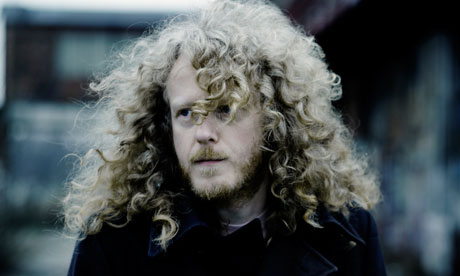
"The book is very ghost-like," says Leyland James Kirby. "So the music is ghost-like too. It can be easily ignored." This seems a strange thing for a composer to say of his music, but then Kirby is talking about the soundtrack he has written for a film inspired by a very strange book: WG Sebald's The Rings of Saturn, a sprawling work based around a walk Sebald took along the East Anglian coast and the thoughts it provoked in him. Taking in everything from the Holocaust to outer space, from Chinese trains to crappy hotels, the 1995 novel so struck film-maker Grant Gee that he retraced the writer's footsteps, talking to people along the way, and turned the results into a film called Patience (After Sebald), to be screened in London this week.
On Kirby's soundtrack, loops of Sebald's beloved Schubert are battered and eroded: pianos lollop along, drenched in static, while detuned voices burble from the murk. Sebald's line "the ghosts of repetition that haunt me with ever greater frequency" could easily have been written about Kirby's music itself, so full is it of rolling, wraithlike samples seemingly dredged up from a half-remembered past.
Gee, who made 1998's acclaimed Radiohead documentary Meeting People Is Easy, equates Kirby's style with black-and-white film stock. "Sebald's images of dust falling, particles and granularity – that's precisely what you get from James's stuff. It's this gritty, dusty, destroyed universe." Kirby got to work on Schubert after Gee handed him the earliest recordings of the Austrian composer's music he could find; he set about chopping out sections and manipulating them.
The soundtrack is a continuation of work Kirby makes under the name The Caretaker. This includes sample-based pieces such as 2011's An Empty Bliss Beyond This World, in which he intercut 1930s ballroom records to evoke dementia. "Scientists are saying the last thing to go in the brain is musical memory," Kirby says. "People with Alzheimer's will hum or sing the same things over and over. And, being from between the first and second world wars, a lot of these tracks are about loss, disappearance – they're melancholy before I've even begun."
It's a world away from his first project V/Vm, in which he warped the music of artists such as Atomic Kitten, Wham! and Chris de Burgh. Why did he do that? "Love isn't like Lady in Red, is it? So I made an album which reflected love in the way a lot of people live these days – dysfunctionally." The title of this 2000 work was Sick Love; it took classic love songs and slowed them down to a crawl.
"I was sick of people telling me, 'You're no good, you can't make good music.' There's only so long you can listen to that before you say, 'Right, I've made something a bit more worthwhile and more beautiful.'" Here, Kirby is referring to original compositions, made on piano and synth under his own name, including 2009's epic 240-minute album suite Sadly, the Future Is No Longer What It Was. "I was at a very low point," he says. "I felt no one was listening to what I did. I was going a little bit nuts. Going out too much, trying to find the balance."
At the time, Kirby, from Stockport, was managing to drink for free in his adopted home of Berlin ("it must be my charm and expertise at the bar") and going on pan-European benders. One trip saw him getting drunk in Madrid with Real Madrid's goalkeeper Iker Casillas and the Iron Maiden road crew, before persuading two girls to take a roadtrip back to Berlin with him. "It's important to enjoy beautiful women and beautiful drinks, and it's definitely fuel for work. But you look at yourself sometimes and think, 'Something's got to change.'"
Gee has talked of the "pleasure of catastrophe" when reading Sebald's elegant work, and it's a sentiment Kirby seems to echo: "If ever I feel down, I always try to enjoy those times in the same way I enjoy the times when I'm up. There is a perverse pleasure in being miserable." His rare live performances, though, are known for their vivaciousness (and there is one to coincide with the film's screening). At one recent appearance, he rolled down the stairs of the auditorium in a silver lamé suit to Motörhead's Ace of Spades, before finishing his performance with a mimed version of Elton John's Can You Feel the Love Tonight?
"Once, in Holland," he recalls, "I was rolling around this venue and dislocated my knee. I had to bang it back in before finishing the show – it was black for four months. Other musicians are quite happy sat behind a Mac, but I get so bored. It's just waking people up, giving them what they don't expect."

